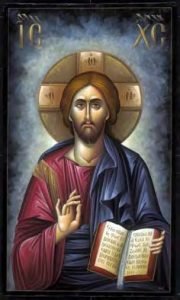 So Christ, the Word of God, truly brings His saving work to fulfillment by submitting Himself, with all of creation, to God the Father. This act of thanking God the Father for life itself is the final act of Christ and the act that we are called to repeatedly perform in worship of our God – it is the true Eucharistic act of Christ and the act that we are called to remember and do. According to St. Isaac and Eastern mystical tradition, once this mission of the Word is completed, human words of profound proclamation, praise and supplication will be forever transformed into the true worship of God.
So Christ, the Word of God, truly brings His saving work to fulfillment by submitting Himself, with all of creation, to God the Father. This act of thanking God the Father for life itself is the final act of Christ and the act that we are called to repeatedly perform in worship of our God – it is the true Eucharistic act of Christ and the act that we are called to remember and do. According to St. Isaac and Eastern mystical tradition, once this mission of the Word is completed, human words of profound proclamation, praise and supplication will be forever transformed into the true worship of God.
This rooting of Word and Sacrament in the divine “silence” from which God articulates the economy of salvation, will perhaps seem strange and unwarranted to non-Eastern Christians, as will the insistence upon their fundamental unity. For centuries Catholics and Protestants have been enmeshed in controversy over the relative importance of the two, indicating by the very nature of their arguments that both confessions consider Word and Sacrament to be separate, if complementary, realities that together constitute the essence of the Church. Calvin well expressed the Western conception when he defined the Church as God’s instrument of salvation through the “preaching of the Gospel” and the “institution of the sacraments.” Such a definition presupposes a distinction, even a dichotomy, between Word and Sacrament, preaching and liturgy, proclamation and celebration, that is quite foreign to Eastern theology. In the thought of the Eastern Fathers, grounded as it is in the wholistic nature of the apostolic vision, Word and Sacrament are inseparable. Together they form a unique and unified medium of communion between God and man, a reciprocal participation between divine and human life.
Hopefully my readers will understand this. There can be no separation between the Gospels and our true eucharistic worship. They are one. Our worship makes real and present the Gospel of Jesus Christ. It supports and makes real our active remembering of the actions of the Gospel.
From the perspective of Eastern Christianity, the relationship between Word and Sacrament, proclamation and celebration, must be explained in such a way as to stress the absolute, fundamental unity between the two. The Word of God is made real by and through our worship of God which brings us into communion with Him.
